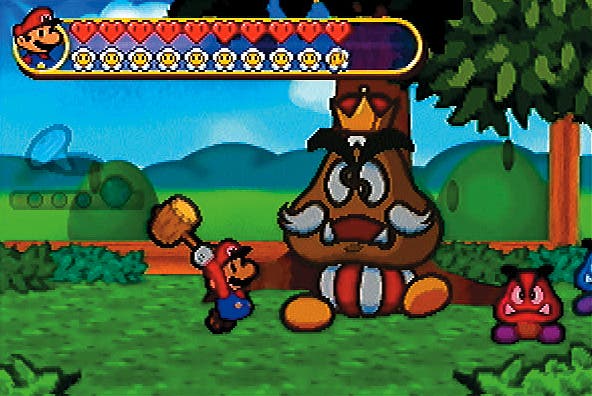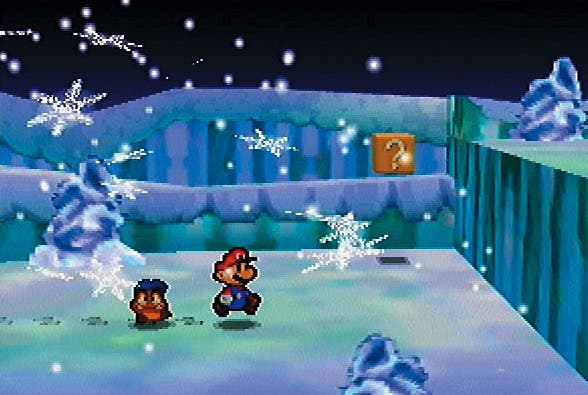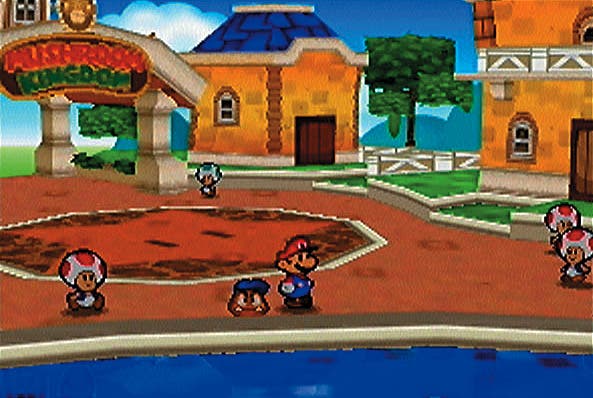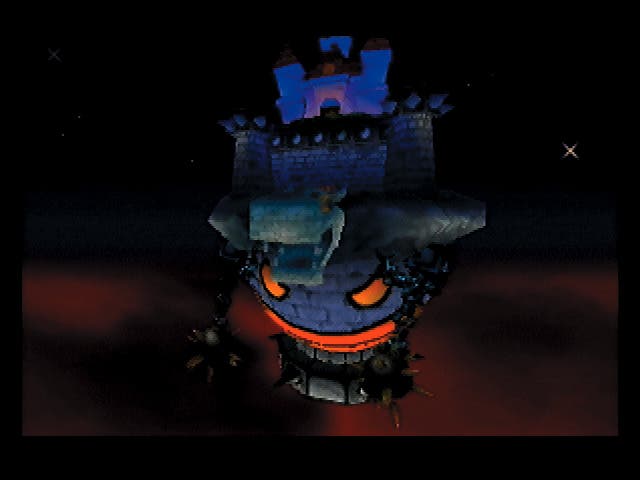Paper Mario
Review - the Nintendo 64 breathes its last, with a lick of flame between the teeth

Back to the future
It's easy to dismiss the Nintendo 64 now that we have the PlayStation 2 and GameCube. Watching some of the latest Xbox games in action, you could be forgiven for thinking the N64 a relic of a past era, and Nintendo don't seem all that keen to drag it out either. But they do have a couple of good titles left in them. Paper Mario was given a rapturous reception by fans of the console when it hit the States earlier this year, and the PAL version has finally been released this October in Europe. For N64 fans, it's the game of the year. One of the hallmarks of Nintendo's success with the Super Nintendo was Super Mario RPG. It was widely criticized by diehards, but it had a lot of in-jokes, plenty of cameos from famous Mario characters and above all else it had class. It was a one-time crossover from the collective talents of Nintendo and Squaresoft, and it showed in its cutesy graphics, expert battle system, spellbinding atmosphere and excitable storyline. The only thing it lacked was Square's trademark muddling complexity, and was that such a bad thing? Paper Mario is a vastly superior game to SMRPG. It starts out innocently enough; Mario and Luigi receive an invitation to join Princess Peach at her castle for a party. Finding her alone in her private chambers away from the hubbub of her guests, Mario and the Princess share an intimate moment, and then with a crash the whole world starts slipping away from them.

Blown apart in a Marioland minute
The evil Bowser and his sidekick Kappa whisk the castle away into the stars, making it the centrepiece of their nefarious plans. Mario bravely fights Bowser, but the fire-breathing shell-clad brute rips him a new one, and throws him from the castle balcony. Plunging to his doom, poor Mario has only a fleeting opportunity to catch a glimpse of the wrong he must undo. When he awakes in a strange village in the middle of nowhere, he sets about defeating Bowser. Before he takes the wily old trickster on once again however, he must learn a few tricks of his own, and with help from a number of sources (including a friendly family of Goombas who teach him the basics), he begins his rehabilitation and training. Along the way Mario invites a number of friendly characters to join his party, the first of which is the Goombas' youngest, Goombarrio. Mario's exploits in his latest adventure are best described as a cross between a classic 2D platform game and an RPG. You spend most of your time moving about an ostensibly 2D side-scrolling view (although you can move in an out in some areas too), searching out coins and other bits and bobs hidden in trees and bushes, and taking on the local nasties. When you spy an enemy, you can rush up and hit him with your hammer, getting first strike. This robs the little git of a couple of health points and sets him up for a quick despatch on the battle screen.

Hit pointers
The battle system is actually quite sensible. Whenever you go into battle the proceedings switch to a battle screen, where the turn-based fighting begins. Your health (or Heart) points number ten to start with, and gradually increase as the game develops. You never reach Final Fantasy levels of silliness, but you still feel the benefit of the extra points. Mario and his compatriots also have Badge points and Flower points. Badges are hidden items that allow you to enhance your characters' abilities with new attacks. You use a badge for a short while, limited by the number of badge points you have, and like Heart points the capacity for these goes up the further you get. Flower points are equally important, used for magical attacks and such. When you level up, you get a choice of which of the three types of point you want to increase. Levelling up involves a fourth kind of point; Star points. These accrue like experience as you plough through battle after battle. The thing that will really strike you about Paper Mario though isn't so much its rampant disregard for the conventions of the traditional role-playing game, such as limitless hitpoint numbers and shameless plot clichés, but its graphical style. Various elements of the game have a three-dimensional feel - the trees, the ground, the buildings - but the rest of the picture is decidedly 2D. This is particularly true of your movement, with Mario and friends sauntering along from left to right, bopping from ledge to ledge, and even the battle screen is 2D. Moreover, the sprites that represent the characters are flat and cartoony, hence 'Paper' Mario. The effect is initially quite confusing, but it grows on you. It's the sort of audacious graphical style that only Nintendo would think of implementing in its flagship N64 role-player for 2001.

Conclusion
Some will perhaps find the linearity of the game disturbing, but I can't recall a single recent RPG that wasn't in some way or other - Final Fantasy VII, one of the best games on any system ever, was for all intents and purposes a collection of cutscenes linked by battles and text. The seven varying lands explored by Mario and his band of merry cartoons contain much excitement, and the game design is for the most part ingenious. Of the various characters you meet, none is of less import than any other. Take the Fish, for example. You don't meet him for a while, but by the time you do there are impossible-to-reach areas that a water-dwelling companion would make short work of. For each character there are hundreds of puzzles in the game that require their interaction, and battles that demand their particular talents. Paper Mario is an RPG rich with ingenuity and style, and it's good fun besides. There are twists and turns in the plot, plenty of familiar faces and those all-important Mario moments that only a true fan will understand. It's also the best RPG on the Nintendo 64, and acts as a superb gateway to the genre, particularly for young fans to whom the bewildering complexity of games like Final Fantasy means nothing. This is the N64's Secret of Mana, with a few more familiar faces to boot. Buy it and forget about the GameCube, for now.
-

